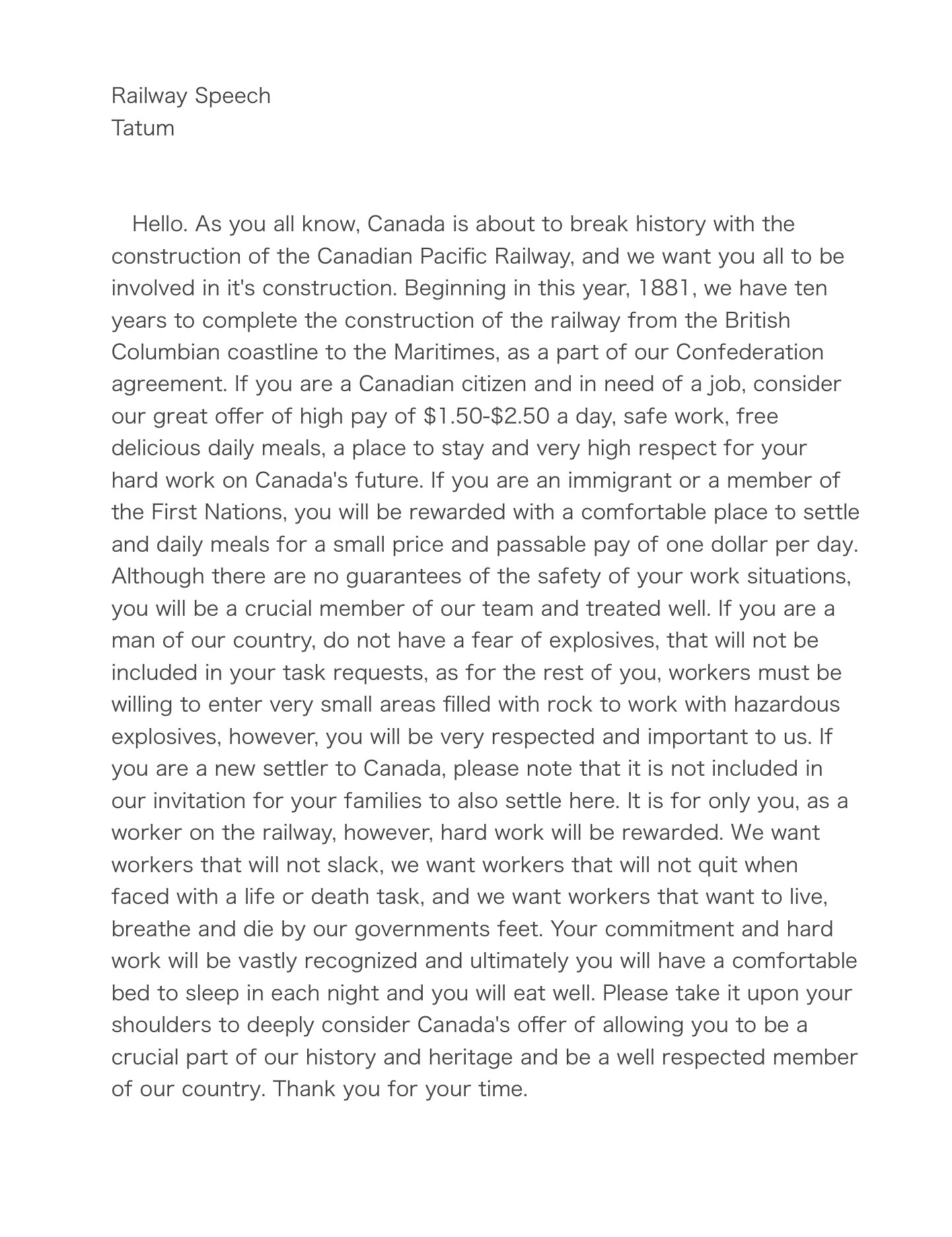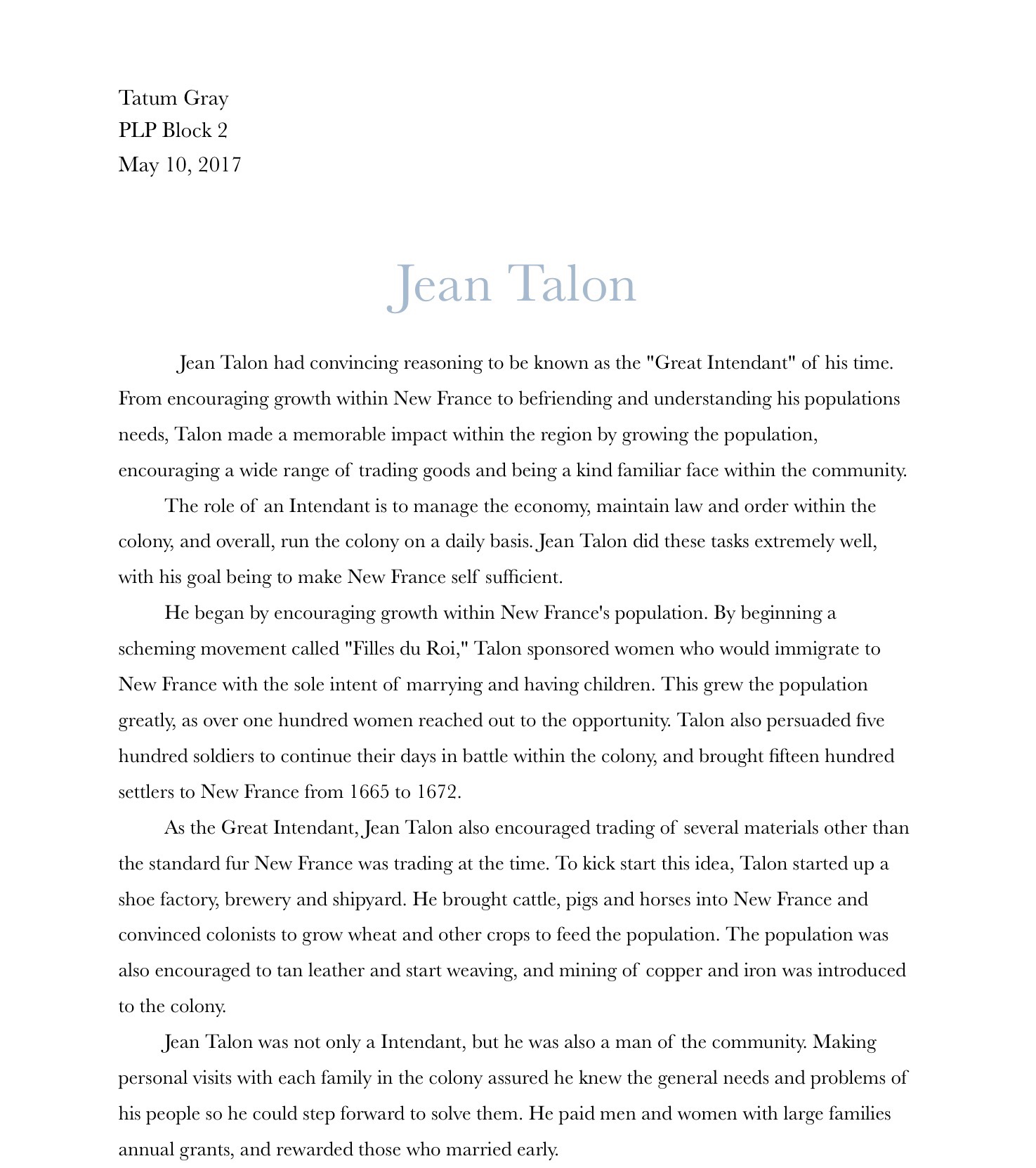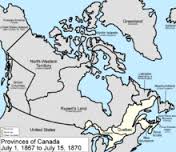For the past while in PLP 9, we have been studying the great moments in history (but mostly the Canadian parts…) This unit has covered all the main events in the history of our country. These events include New France, the Canadian Pacific Railway, Confederation, the First Nations people, Hudson’s Bay Company, trades and more.
We started off with colonization and a comic reflection. Colonization is the selling and controlling of other lands. We had to analyze what each comic strip meant and how it related with North American history.

We learned about how colonization effects a civilization and how different tactics were used to colonize an area. We also learned that there are five different stages in colonization.
Next, we were onto New France. We learned about the notable people in New France, the trades and different aspects involved in the civilization. To reflect on our learning, we did two mini projects. The first one was a partner project about people’s lives in New France. Makyla and I made a brochure for a farm that may have been for sale in New France during that time period.


The next part of this project was the individual paragraph and Explain Everything on a notable New France member of our choice. I chose Jean Talon, who was an Intendant in New France.
I researched Jean Talon and how he helped impact New France. I also wrote a paragraph on him.
Once we finished our journey in New France, we studied the Hudsons Bay Company and trade in Canada. We learned about the trading posts, fur trades and First Nations involvement. We also learned about the North West Company and how they compared to the Hudson’s Bay Company.


Moving along was the differences between Upper and Lower Canada. I found it interesting how different the two colonies were and how different the two regions are today, as what once was Lower Canada now is mainly French and upper Canada is mainly English.



Now, for one of my favourite parts and assignments we have the Canadian Pacific Railway, or the CPR. The Canadian Pacific Railway held a huge impact on Canada. It improved the economy, made trade even easier and more accessible, brought settlers to Canada and helped shape the country we live in today. For our assignment on the CPR, I wrote a speech to organize people into a union of workers for the railway. I think it went really well and it helped me with being comfortable during a public speech in front of my classmates.

Now, for our most recent topic area, we have the gold rush. Our class researched the cariboo gold rush and how it impacted the Canadian economy. To reflect on our understanding, we created a character profile card for a person in the gold rush. Our card had to include a picture, facts, and two artifacts they possessed. I decided to profile a fictional bread maker named Marie Scarlette. She was one of the best bread makers in town and came from a large family of chefs and bakers. I used a picture of a woman from the cariboo gold rush and found my facts on many different museum and informative websites.

Finally, for our final project on this socials chapter, Makyla and I have prepared and executed a debate that shows our knowledge about British Columbia joining confederation. We chose confederation as the most important event in Canada’s history because if British Columbia didn’t join confederation, our country, as well as our neighbours down south would be very different. Confederation ended up bringing Canada together as an entire whole and making it what it is today. It’s hard to think about where I would be if B.C wasn’t apart of Canada.
British Columbia officially joined confederation on July 20th of 1871, but not everyone in the colony was ecstatic about this decision. First Nations, for example, had no say in the choice made by the British Columbian people. However, because of B.C joining confederation, our country has been able to thrive as a whole rather than America taking it over.
When you think about it, basically everything in Canada’s history effected B.C’s choice to join confederation. The people living in the area at the time had taken all the events over the years in to account as they stated their opinions to the government. From trade dating back to the North West Company and the Metis, the CPR and the gold rush, these were all supporting factors to B.C’s ultimate decision.

The first reason I think B.C would be better off joining confederation was that joining would open up their doors to national and international trading posts. As a single colony, British Columbia didn’t have much access to international trade. They also didn’t have access to other Canadian goods, which could vastly help them and the economy. If B.C were to decide to join confederation, not only would they have access to Canadian resources, but they would be apart of all Canadian trading connections across the globe.




The third and final reason I think that B.C would be better off joining confederation is the Canadian government had said that they would pay off all of British Columbia’s debt. When B.C struck gold, tons of settlers travelled near and far to mine in British Columbia’s rocky mountains and rivers. However, after the “boom went bust” all those people left to go home and the economy crashed. What once was a thriving colony now was bare and the residents didn’t have any money to stay there if they weren’t benefiting from the gold, so they packed up and left. This left B.C in a deep and scary debt, they had spent their money into the ground and they didn’t have the money to revive what once was. Canada had volunteered to take their debt off their shoulders and pay for it, but this would only happen if they decided to join confederation. If British Columbia had decided not to join the rest of Canada, we would still be in debt as a colony today and it’s hard to imagine how they would manage to pay it off without making dreadful and ultimate sacrifices.
Overall, I think B.C would benefit from joining confederation because of the trading opportunities, CPR and diminishing their deep set debt.
Those were my three main points, and Makyla also had her points for B.C not to join confederation and be independent. You can read about her side of the story here.
To conclude, I really enjoyed our blast from the past studying Canadian history (the blast part was a pun because of the gold rush, just in case you didn’t catch on…) I learned about everything from the ‘Great Intendant’ of New France to the Hurdy-gurdy girls. I’m excited to learn about WW1 next year, but there won’t be any blog posts on that, sorry!
Until next time…





